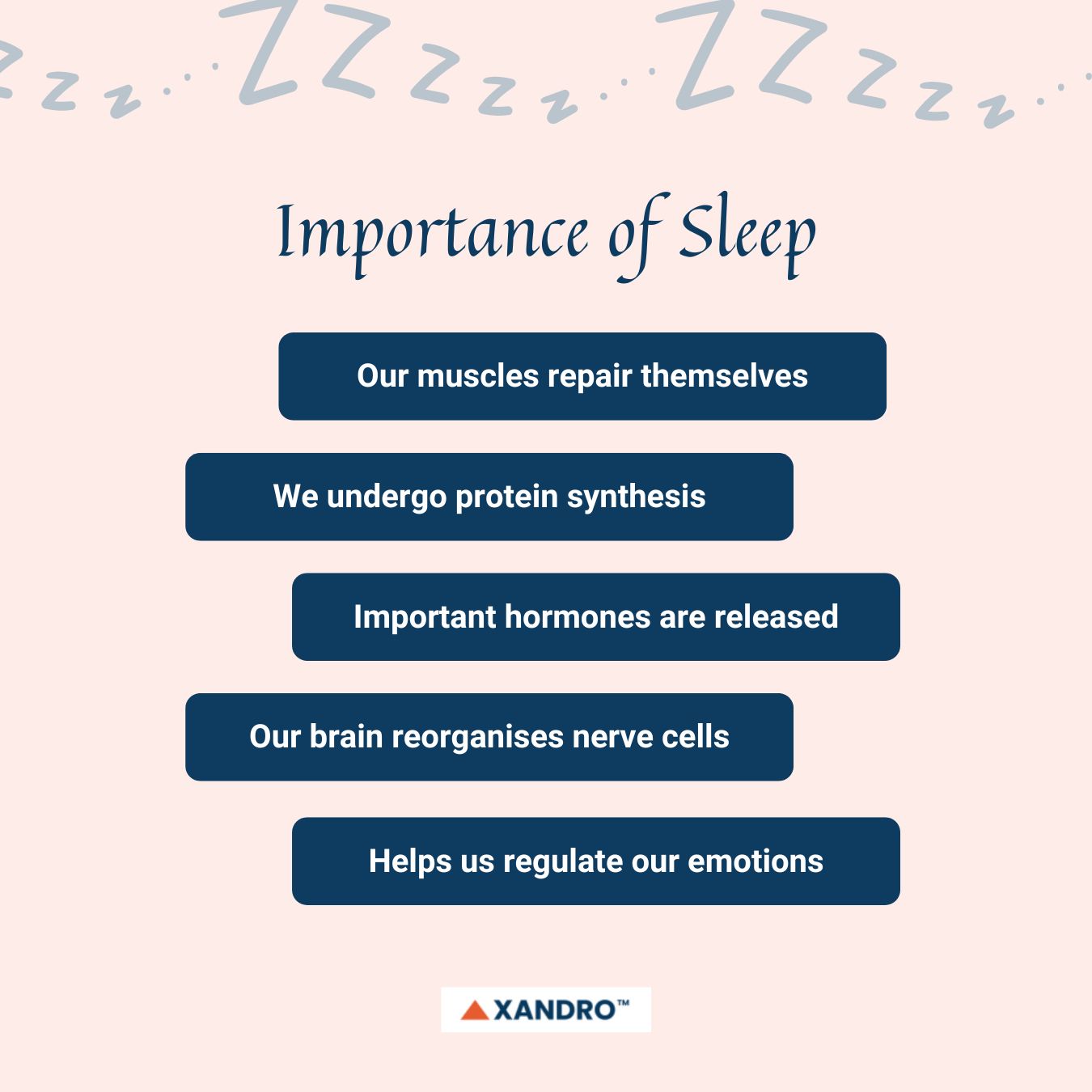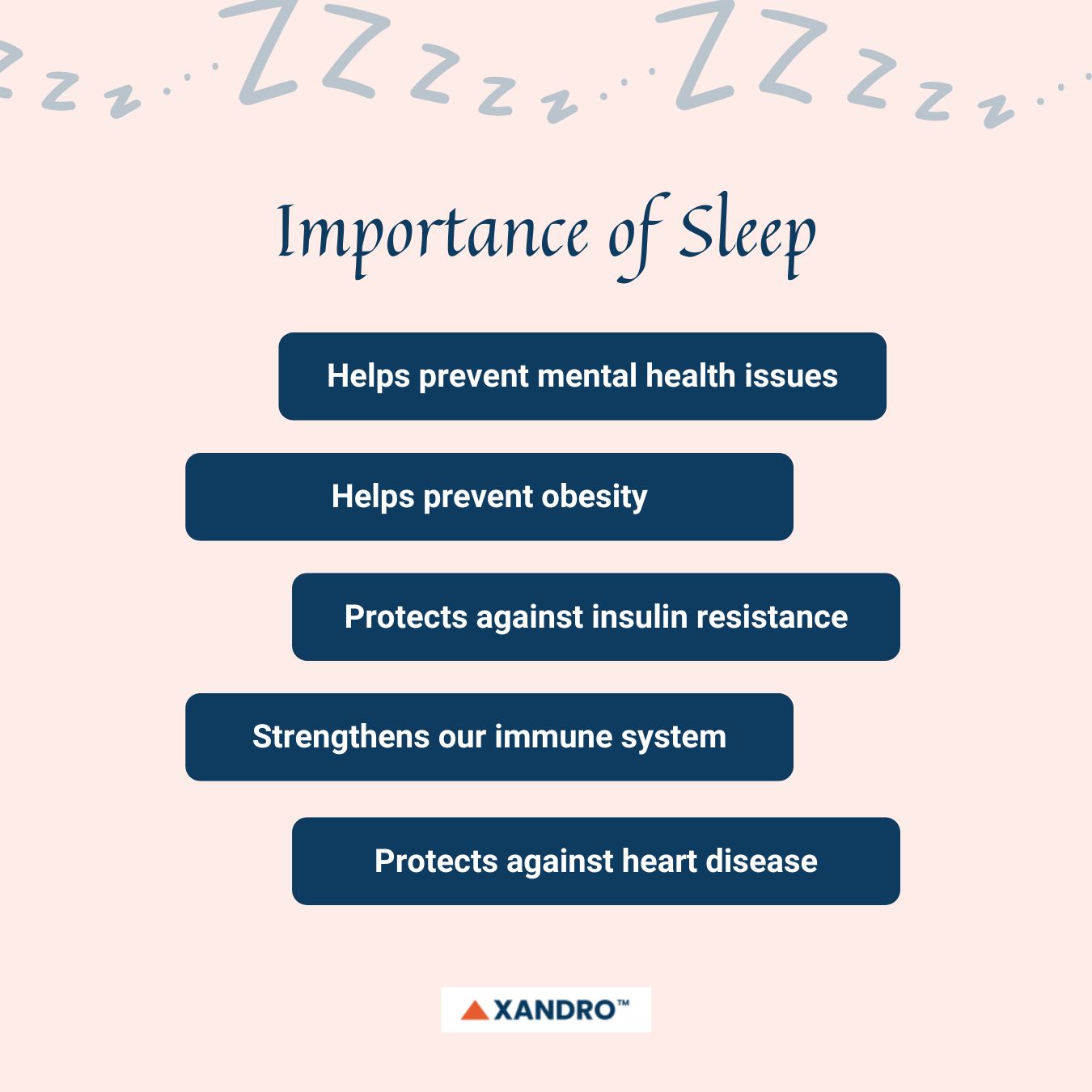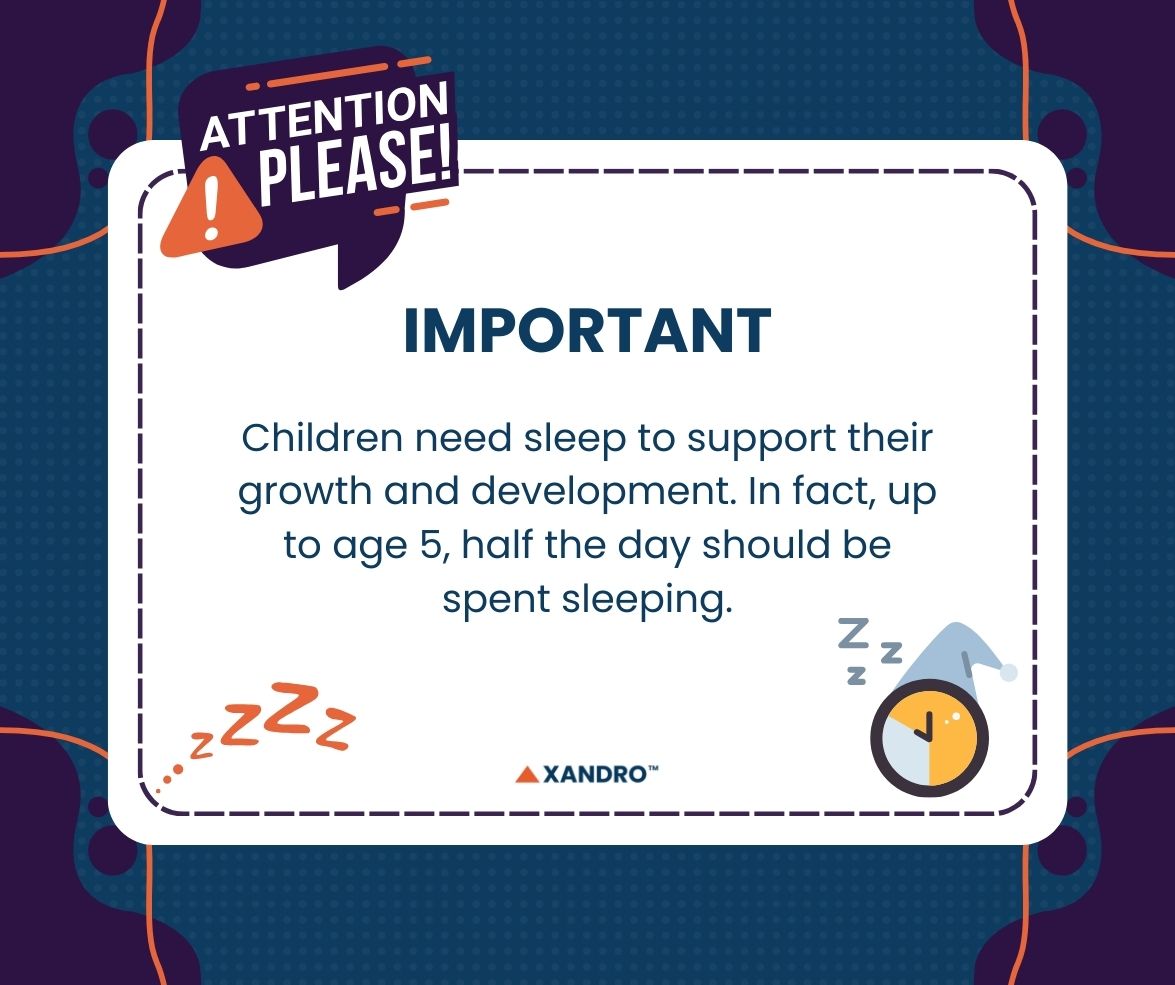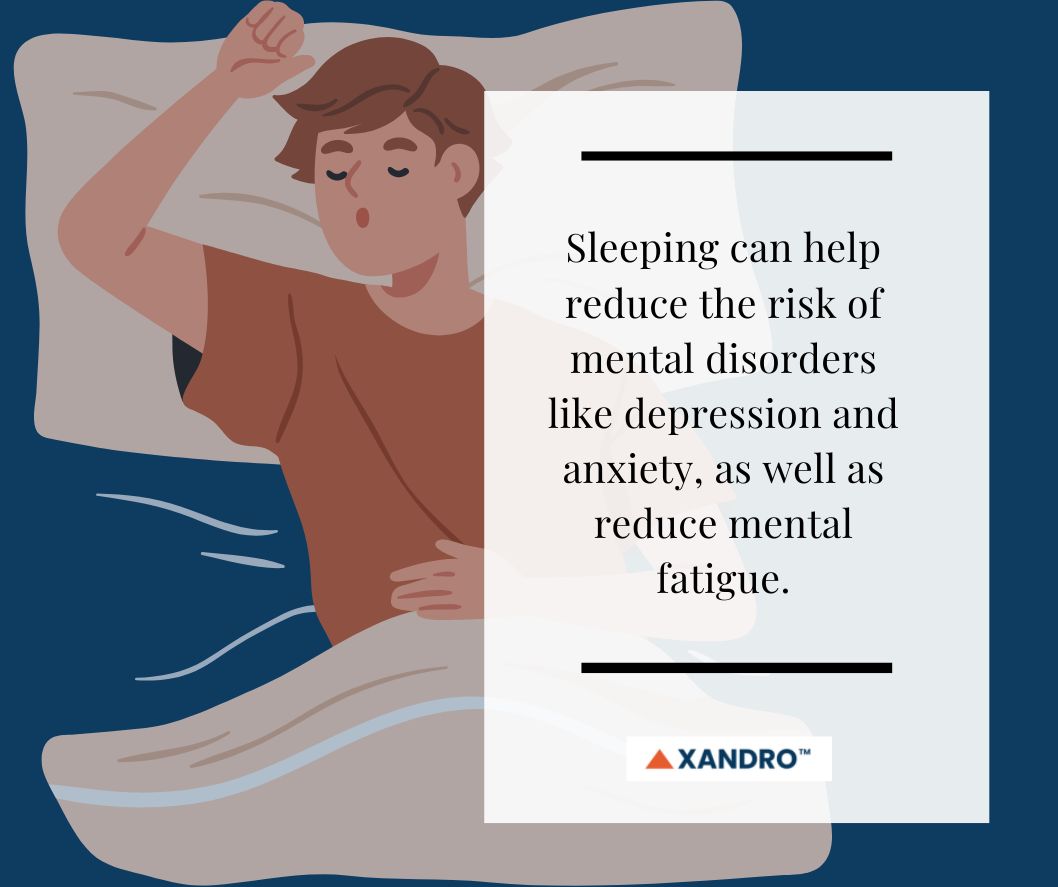What Does Sleep Do for My Body?
26th Mar 2024
The Importance of Sleep
Did you know, we spend about one-third of our lives sleeping?
Sleep is incredibly important for functions within our bodies to keep working, and despite the body seeming quiet, the brain continues to run and keep everything working as it should.
But why do we need sleep scientifically?
This post covers the importance of sleep and the health benefits of sleep, touching on:
- What is the Main Importance of Sleep?
- The Importance of Sleep for Kids
- Why is Sleep so Important for Mental Health?
Sleep is needed for the different processes in our bodies to function, such as our heart, circulatory system, our metabolism, respiratory system and immune system. If we don’t get enough of it, our physical and mental capabilities the next day can be negatively affected, as can our metabolism, our ability to fight diseases and to develop immunity.
Sleep is needed for how well we think, work, learn, communicate and react to situations, and really, it’s needed to function at our best each day.
What are 5 purposes of sleep?
Did you know that the scientific purpose of sleep is still unknown? Despite that, there are a range of reasons why it’s believed to be needed in humans, so let’s go over them!
- Sleep allows the body and mind to recharge and conserve energy so we’re refreshed for the next day.
- Keeps the body healthy by repairing cells and helping fend off diseases.
- Allows the brain to function properly, such as to concentrate, think and process memories.
- Sleep helps us regulate emotions and give us emotional stability.
- Needed to regulate our hormones, such as our hunger hormones and insulin.

Our body operates on a 24-hour clock or cycle, known as the circadian rhythm. This clock controls when we’re refreshed, alert, tired and then ready for bed.
The circadian rhythm might be linked to a compound produced in our brain, known as adenosine, with levels increasing throughout the day as we grow more tired and then which is broken down during sleep.
Light also affects our circadian rhythm, with nerve cells in our brain helping our brain determine whether it’s day or night when our eyes are exposed to natural or artificial light. When light fades in the evening, the body releases the hormone, melatonin, which makes our body tired — hence why it’s important to stay off bright electronic devices near bedtime. In the morning, our bodies release another hormone called cortisol, which promotes energy and alertness and thus, the cycle repeats.
Our actual sleep cycle itself is also in stages, but to learn about that, read our article on the science behind sleep and the different stages of sleep.
Let’s go over 10 reasons why sleep is important:
- Our muscles repair themselves.
- Our bodies undergo protein synthesis.
- Important hormones are released.
- It helps out brain function by reorganising nerve cells.
- Helps regulate our emotions.
- Helps prevent mental health issues.
- Controls the hunger hormones, ghrelin and leptin, helping prevent obesity and type 2 diabetes.
- Protects against insulin resistance.
- Strengthens our immune system and fights against infection and inflammation.
- Protects against heart disease.

As you can see, sleep is incredibly important and getting enough of it and at the right times is as important as other basic needs, like eating and drinking water. Let’s go over some more specifics about the importance of sleep, such as on children.
Children need sleep to support their growth and development. In fact, up to age 5, half the day should be spent sleeping. According to the National Sleep Foundation:
- Newborns, between ages 0 and 3 months, need 14 to 17 hours of sleep a day.
- Infants, between ages 4 to 11 months, need 12 to 15 hours of sleep a day.
- Toddlers, between ages 1 to 2, need 11 to 14 hours of sleep a day.
- Preschool children, between ages 3 and 5, need 10 to 13 hours of sleep a day.
While there is no magic number for the amount of hours of sleep needed, these guidelines help when raising children and giving them the best chance of development possible, especially for their brains and growth.

What about the importance of sleep for students?
For school-aged children, the recommendations are as follows:
- School-age children, between ages 6 to 13 years, need 9 to 11 hours of sleep a day.
- Teenagers, between ages 14 to 17, need 8 to 10 hours of sleep a day.
Sleep is needed for our emotional and mental health. As we sleep, various areas in our brain are active, such as the amygdala, striatum, hippocampus, insula and medial prefrontal cortex, and these areas are used to regulate our emotions. This suggests that sleep supports our emotional well-being, but a lack of sleep also can impact our mental health.
The importance of sleep for mental health is seen strongly in times of not getting enough sleep. Sleep deprivation has been found to contribute to the development and progression of mental health issues and then, once a mental health issue develops, it can also contribute to poor sleep, so it’s a nasty cycle. Sleep deprivation has been found to have an impact on mood swings, anxiety and depression. If you want to know of the disadvantages of sleep on the body, the only one comes from too much sleep, which, like sleep deprivation, may lead to heart disease, obesity, diabetes and anxiety.
Read our article about sleep deprivation to see how it affects your body.
Why is sleep important for the brain?
When we sleep, multiple regions of the brain are in use. These include:
- The Hypothalamus: the nerve cells in this structure affect sleep and arousal.
- The Brain Stem: Controls the transitions between being awake and sleeping. Cells here, along as withing the hypothalamus, produce GABA, and the brain stem also plays a large role in REM sleep.
- The Thalamus: Only really becomes active during REM sleep, sending images, sounds and sensations that we experience during our dreams.
- The Pineal Gland: Increases the production of melatonin, helping put us to sleep at night.
- The Basal Forebrain: Promotes sleep and wakefulness, while also releasing adenosine to support your sleep drive. Caffeine can block adenosine, counteracting sleepiness.
- The Amygdala: Helps process emotions, with activity here increasing during REM sleep.
Now that we know how important the brain is for sleep, how important is the opposite: sleep for the brain?
As mentioned previously, sleep is needed to reorganise and maintain the pathways that allow us to learn and create new memories. It’s also needed to reduce mental fatigue and remove toxic waste by-products that have built up during the day, suggesting that sleep helps clear the brain and maintain its proper function. It’s also been found that sleeping can help reduce the risk of mental disorders like depression and anxiety (see section above).
To learn more about the effects of not getting enough sleep, read our article about the effects of sleep deprivation.

Why is it important to sleep at night than day?
Our bodies have a sleep-wake cycle, known as the circadian rhythm, and because of this, it’s important to sleep at night during the day. Sleeping at night keeps us in sync with our circadian rhythm and everything that comes with it.
For example, at night as the lights go down, which our brain senses through our eyes, our body releases melatonin, a sleep hormone. This makes us tired and allows us to have a good night’s sleep, but if we decide to sleep at some other time, such as from sleeping late due to working, playing, studying or even from jetlag, our circadian rhythm gets thrown off and it can be incredibly difficult to get enough sleep. This can lead to low energy, poor mental performance and an increased risk of health conditions.
One study looked at the effects of shift work and sleeping during the day for doctors and found that they received significantly less sleep when working night shifts compared to working day shifts, performing worse and making more errors.
What about sleeping early vs sleeping late? A study found that those who slept later in the night compared to earlier experienced a delayed melatonin rhythm and a delayed circadian rhythm, suggesting that going to bed earlier is better. Sleeping before midnight is better for our circadian rhythm and health, as well as allows us to get enough sun exposure and potentially increases our lifespan. What’s more, going to bed after midnight can lead to exhaustion, fatigue, burnout and even thyroid problems.
End Note
You should now know why sleep is so incredibly important and why we need at least seven hours each night. It’s needed for our development and health and to maintain proper function during the course of our lives.
We all know what it’s like not getting enough sleep, so why put yourself through that if there’s a chance of waking up refreshed the next morning?
Are you experiencing problems with getting enough sleep? How about try Xandro Lab’s Magnesium Glycinate 500mg? Magnesium is needed to regulate our circadian rhythm as well as our melatonin levels, but learn more about common magnesium glycinate FAQs here!
